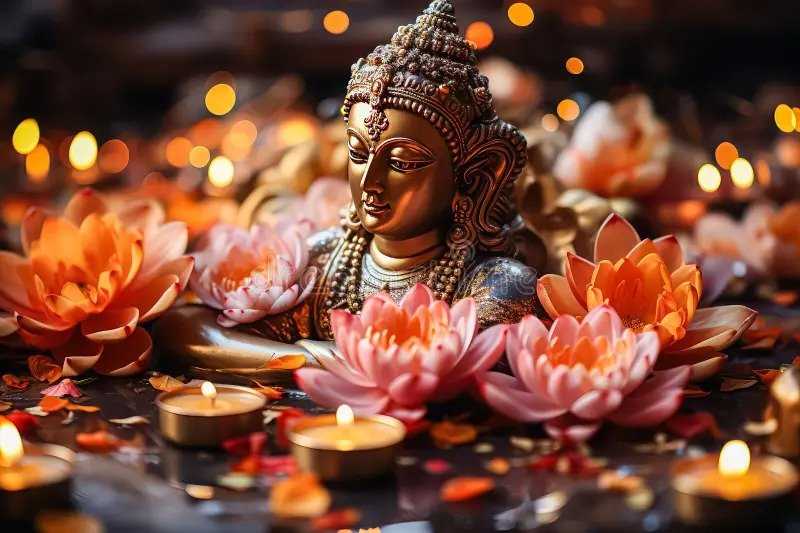By: Himangshu Ranjan Bhuyan
Lakshmi Puja is a vibrant festival celebrated across India, particularly revered in regions like Assam, where it embodies the essence of prosperity, abundance, and spiritual well-being. This festival, dedicated to Goddess Lakshmi, is not merely an occasion for worship but a deep-rooted cultural observance that intertwines rituals, community values, and a connection to the land. The significance of Lakshmi Puja extends beyond the material realm; it represents a holistic approach to wealth that encompasses ethical living, gratitude, and the bonds that tie families and communities together.
As autumn descends and the month of Ashwin unfolds, the air is filled with a palpable sense of anticipation. This season marks the culmination of the harvest, a time when agricultural communities in Assam express their gratitude for the earth’s bounty. Lakshmi Puja arrives as a celebration of life and sustenance, a moment for families to gather, reflect, and seek blessings for the future. The festival resonates with the agricultural calendar, emphasizing the importance of nature and the cycles that govern it. In Assam, this is not just a festival; it is an acknowledgment of the symbiotic relationship between people and the land that sustains them.
Preparation for Lakshmi Puja begins days in advance, as families engage in a thorough cleaning of their homes. This act is imbued with profound significance. Beyond the physical act of tidying up, it symbolizes the removal of negativity and the creation of a welcoming space for the goddess. In Assamese culture, cleanliness is paramount, and it is believed that Goddess Lakshmi favors homes that are neat and well-maintained. The vibrant tradition of decorating homes with alpana designs—intricate patterns made from rice flour—adds a layer of beauty to the celebrations. These artistic expressions serve not only as decor but also as offerings that invite the goddess into their midst.
When the day of Lakshmi Puja arrives, families awaken early, filled with enthusiasm for the rituals that lie ahead. The focal point of the puja is the idol or image of Goddess Lakshmi, often adorned with fresh flowers, fruits, and other offerings that reflect the richness of the earth. The goddess is usually depicted seated on a lotus, symbolizing purity and grace. Surrounding her are representations of wealth, such as coins and rice, underscoring her role as the provider of both material and spiritual prosperity. The presence of the goddess in this form invites devotees to connect with her not only through reverence but through the act of celebration itself.
The rituals commence with heartfelt prayers and the recitation of sacred mantras. This moment establishes a sacred connection between the devotees and the divine. The atmosphere is filled with the fragrance of incense and the sound of bells ringing, creating an ambiance steeped in spirituality. Families gather around the puja area, their collective energy amplifying the prayers as they express gratitude for the blessings they have received. The rituals embody the spirit of togetherness, as family members join hands in devotion and reverence.
As part of the offerings, rice holds particular significance. In Assam, rice is not merely a staple; it symbolizes nourishment and abundance. By offering rice to the goddess, devotees express their appreciation for the sustenance provided by the earth. Additionally, the presentation of fruits like bananas and coconuts, along with traditional sweets made from rice flour and jaggery, reflects local agricultural practices and the bounty of the harvest. These offerings go beyond mere rituals; they represent a deep-seated respect for nature and its cycles, reinforcing the connection between the land and its people.
The lighting of diyas or earthen lamps is one of the most striking aspects of Lakshmi Puja. As dusk approaches, families light these lamps, placing them at entrances and within the puja area. The soft glow of the diyas illuminates homes, transforming them into sanctuaries of light. This act symbolizes the dispelling of darkness and ignorance while inviting wisdom and prosperity into the household. It is believed that the flickering flames guide Goddess Lakshmi into their homes, heralding her blessings. The sight of homes aglow with countless diyas serves as a metaphor for hope, divine grace, and the spirit of the festival itself.
A particularly touching ritual involves drawing the goddess’s footprints, usually created from rice flour or coloured powders. These footprints lead from the entrance of the home to the puja area, symbolizing the arrival of Goddess Lakshmi. This act emphasizes the belief that inviting Lakshmi into the household ensures her blessings. The footprints serve as a visual reminder of the goddess’s grace and the importance of maintaining a sacred space for her presence.
In rural communities, the connection between Lakshmi Puja and agriculture is particularly pronounced. For farmers, this festival is an occasion to seek blessings for a successful harvest. The significance of the harvest season is deeply felt, as it sustains families and communities alike. Many families offer the first yield of their crops to the goddess, expressing gratitude for her protection and blessings. This act of devotion acknowledges the fundamental relationship between people and the land, reinforcing the community’s reliance on agriculture for sustenance and livelihood.
Lakshmi Puja is characterized by its community celebrations, bringing people together in shared worship. In many towns and villages, large-scale community pujas are organized, where individuals gather to honour the goddess collectively. These public celebrations often take place in temples or community centers, where idols of Goddess Lakshmi are installed, and elaborate rituals are performed. The communal aspect of these celebrations fosters a sense of unity, emphasizing that prosperity is a shared blessing. The gathering of families, friends, and neighbours during these festivities creates an atmosphere of camaraderie and collective joy, strengthening the social fabric of the community.
The cultural richness of Lakshmi Puja is further enhanced by the inclusion of traditional performances. Folk dances, songs, and artistic expressions are often integral to the festivities, showcasing the vibrant heritage of Assamese culture. These performances serve not only to entertain but also to educate and engage younger generations in their cultural roots. Through traditional arts, the festival becomes a platform for cultural expression, allowing individuals to connect with their heritage and celebrate their identity. The presence of cultural activities during Lakshmi Puja infuses the celebrations with energy and vibrancy, making it a joyous occasion for all involved.
Charity and generosity are paramount during Lakshmi Puja, reflecting one of the festival’s most important aspects. It is believed that sharing wealth and resources amplifies the blessings of Goddess Lakshmi. Many families take this opportunity to donate food, clothing, and other essentials to those in need. This act of giving, known as daan, is viewed as an essential part of the puja, reinforcing the belief that true prosperity lies not only in individual wealth but also in uplifting others. The spirit of generosity cultivated during Lakshmi Puja promotes social harmony and ensures that the well-being of the community is prioritized alongside personal gains. By engaging in charitable acts, individuals embody the values of compassion and empathy, contributing to a nurturing environment where everyone can thrive.
The ethical and spiritual dimensions of Lakshmi Puja add depth to its significance. In Hindu philosophy, wealth is not viewed solely in material terms; it encompasses knowledge, virtue, and happiness as well. Lakshmi embodies this broader understanding of wealth, emphasizing that material success must be accompanied by spiritual growth and moral integrity. The rituals associated with Lakshmi Puja serve as a reminder of the importance of living a virtuous life, where wealth is used for the betterment of oneself and society. By engaging in charitable acts and ethical living, devotees align themselves with the values embodied by the goddess, ensuring that their own prosperity is enriched by moral integrity.
The relationship between Goddess Lakshmi and Lord Vishnu plays a crucial role in the worship practices of Lakshmi Puja. As the protector and preserver of the universe, Vishnu represents dharma, or righteousness. This dual worship reflects the belief that wealth and prosperity are best enjoyed when aligned with ethical principles. The teachings of both deities emphasize the importance of maintaining moral integrity while pursuing wealth. This theological perspective reinforces the idea that true prosperity is achieved when material pursuits are coupled with ethical behaviour and spiritual growth.
The significance of Lakshmi Puja extends beyond individual households and communities; it contributes to the broader cultural landscape of Assam. The festival acts as a unifying force, bringing together people from diverse backgrounds and fostering a sense of belonging. Through shared rituals and collective celebrations, Lakshmi Puja becomes a reflection of the community’s values and aspirations. The emphasis on unity and cooperation during the festival reinforces the idea that prosperity is a shared endeavour, encouraging individuals to work together for the common good.
In contemporary society, the teachings of Lakshmi Puja remain relevant, even as the world undergoes rapid changes. The festival encourages individuals to reflect on their values and priorities, particularly in a time when materialism often overshadows spiritual considerations. Lakshmi Puja serves as a reminder to appreciate the blessings one has, fostering a mindset of gratitude and contentment. The rituals provide individuals with an opportunity for introspection, allowing them to assess their relationship with wealth and its role in their lives.
As society continues to evolve, the observance of Lakshmi Puja adapts to modern contexts while retaining its core values. Urban celebrations may take on new forms, yet the fundamental principles of gratitude, community, and ethical living endure. Families in urban settings may choose to celebrate in smaller gatherings or participate in public temple celebrations, but the underlying essence of the festival remains intact.
The festival of Lakshmi Puja also plays a crucial role in promoting mental well-being. Engaging in rituals and acts of devotion provides individuals with a sense of purpose and connection to their cultural heritage. The collective experience of worship fosters a sense of belonging and community, which can be particularly comforting in an increasingly fragmented world. The practice of gratitude cultivated during the festival encourages individuals to focus on the positive aspects of their lives, fostering resilience and a sense of fulfillment.
Ultimately, Lakshmi Puja is a multifaceted festival that encompasses a rich tapestry of rituals, traditions, and values. It celebrates not only material wealth but also the ethical principles that underpin true prosperity. The festival serves as a reminder that wealth is not solely about material possessions but also encompasses the richness of relationships, community, and spiritual fulfillment. (The writer is Editor in Chief of the Assamese E-Megazine SAMPROTIK. He can be reached at himangshur1989@gmail.com)












